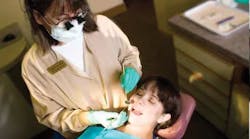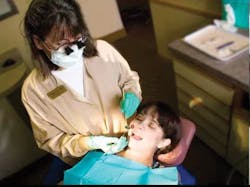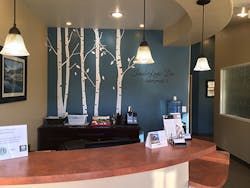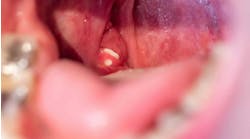Colorado independent dental hygienist offers insights on "running your own show"
BY Angie Rhoades, RDH
Imagine working in an office that schedules patients exactly the way you want. Imagine an office that doesn't have specific production demands, sales quotas, or expectations to up-sell dentistry and products to every patient. Not only that, this office is quiet, relaxed, and radiates a very personal feeling. The best part, though, is you get to take away all produced earnings! Wow ... sounds like a dream, doesn't it? This is what some perceive independent hygiene to be like. While there is some truth to the description, there is more to it than meets the eye.
In Colorado, hygienists have been able to practice independently since the mid 1980s. There is no way to determine how many independent practices there are in Colorado, but the best guess is that 20 to 30 practices are operating around the state. Each hygienist operates his or her practice uniquely. Some practices are strictly portable, going to nursing homes or homebound patients; others work within a dental office, while some hygienists have their own stand-alone practices. Each office has to deal with its own growing pains and struggles.
----------------------------------------------------
Other articles about alternative work settings for hygienists
- HyLife LLC seeks hygienists to expand oral care program
- Ontario's Smile Spa: Independent Canadian hygienist builds practice based on her beliefs
- Help! Let me out: How dental hygienists can explore career alternatives outside of clinical
----------------------------------------------------
The most obvious obstacle is the start-up cost of opening a practice: lease negotiations, attorneys' fees (if used to set up the business), equipment purchases (chair, sterilizer, compressor, suction, X-ray head, sensors), supplies, initial advertising costs, software, and whatever else may come along before the doors even open. The overwhelming amount of debt that can be accrued before a patient walks through the door is stressful!
Once the doors open, the next set of obstacles arise. Will you accept insurance? Is this going to be cash only? How will people learn about your practice? Will you have a receptionist/assistant to answer phones, schedule, and maintain your recare, or is that something you will do at the end of the day after seeing patients? How will the local dental community accept you?
The biggest issue that I have found by talking to fellow direct access hygienists in Colorado is reimbursement from insurance companies. Although we are legally allowed to practice and are recognized by the state to do so, some self-funded insurance plans just refuse to pay us for services provided. These insurance companies and self-funded businesses are under the ERISA Act that was implemented in the 1970s and allows them to dictate who they will and will not pay. Sometimes claims take weeks or even months to get paid. It can take many hours to do the billing, phone calls, and follow-up, so it is important to find time in your schedule to allow for it! If you hire someone to help you with these tasks, just be sure to budget in payroll and taxes, unemployment insurance, and other costs.
It is wise to have a few dentists to refer patients to in case of treatment needs. Having someone in your corner is always a benefit, especially when there is a larger dental community who would rather not have competition from "rogue hygienists" who are opening their own practices. In my practice, I refer out thousands of dollars of restorative treatment every month, and the dentists I work with are appreciative and help me out by reading X-rays, seeing emergency patients, or answering questions that I have. Unfortunately, I have spoken with other hygienists who have been threatened with lawsuits from previous employers who claim that they are violating noncompete clauses, even if there is no such clause in place. I have also heard of patients being dismissed from the dental office for having hygiene treatment at another facility.
Where do new patients come from? This is truly one of the largest obstacles that any business owner faces. How will people know that we exist and how we can benefit them? Print ads are expensive, and from personal experience and talking with others, the return on investment is not there. Websites, online reviews, and social media are less expensive and rather effective; however, unless you are an expert, search engine optimization (SEO) can be tricky. Many people rely on their insurance companies' recommendations for who is in their area. Unless you are a preferred provider, you will not be on the insurance company list, and most insurance companies do not allow hygienists to be preferred providers.
So, with all of the challenges that present themselves to open and operate a dental hygiene practice, is it worth it? Many of the hygienists in Colorado who have taken the leap currently work part-time for dentists while growing their practices. To jump into a brand new practice and expect to make what you would make full-time working in an office probably is unrealistic. However, the happiness and satisfaction that you get from "running your own show" may be reward enough such that the financial part is secondary. RDH
Angie Rhoades, RDH, is an independent practitioner in the Denver area. She can be contacted at [email protected].










